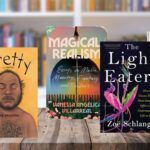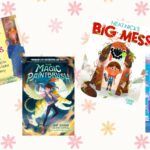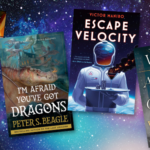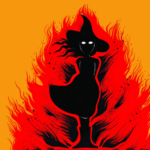Transcript: Nicky Drayden and Helen Ellis
This is a transcript of Recommended Season 4 Episode 12.
AD READ: William Shakespeare’s Get Thee Back to the Future! by Ian Doescher
JENN
You’re listening to Recommended, where we talk to interesting people about their favorite books. Today, Nicky Drayden and Helen Ellis talk about books that captured their attention in big ways.
JENN
Nicky Drayden is a Systems Analyst who dabbles in prose when she’s not buried in code. She resides in Austin, Texas where being weird is highly encouraged, if not required. Her debut novel, The Prey of Gods, was a best of the year pick by Book Riot, Vulture, and RT Book Reviews. In her latest novel, Temper, twin brothers are beset by powerful forces beyond their understanding or control in this thrilling blend of science fiction, horror, magic, and dark humor.
GUEST 1
My name is Nicky Drayden, and Nigerians in Space by Deji Bryce Olukotun is my recommended.
Nigerians in Space is about a moon rock heist, and is a cross genre, a thriller with a little bit of science fiction and a fantasy thrown in there. It follows Dr. Wale Olufunmi, who is a lunar rock geologist for NASA, and he has this cool life set up for himself. He’s working for NASA. He has a wife and kids, but he’s feeling like he’s a little bit stalled in his career. He’s getting passed over for promotions, and he’s just really super frustrated, and he’s kind of the guy who has these big dreams and ambitions and just playing with moon rocks and cataloging things.
Wale gets a mysterious call from a man named Bello, who is a Nigerian politician, and he has this big idea that he wants to solve this problem of brain gain or brain drain. It’s this theory that we’re having to deal with now. It’s a lot of countries are losing their intellectual people to places like the United States and places in Europe, and they’re just losing those intellectual resources. That’s called brain drain. Brain gain is the opposite where he wants to pull those intellectuals back to their home country in Nigeria, and Wale is a Nigerian immigrant.
It appeals to him, this idea, and it’s this mysterious thing where nobody really knows what’s going on with this project. He’s able to track down enough information that he thinks it’s going to be something legit enough that he can pursue it because there’s just one catch, which is in order to prove himself that he’s committed to this project, he has to steal one of the moon rocks from NASA, and it’s a low priority moon rock. It is from the first lunar mission, but it’s a contingency sample or something, so it’s not as important. It’s more like a symbolic gesture that he just really wants to join this team.
There’s this awesome heist scene, and then he’s able to escape the country with this moon rock and his family, and, of course, things never go as planned in books, particularly this one, and some time during his escape, they go to Stockholm, and he loses contact with Bello, who is the contact for this project, and he’s stuck in Stockholm with no visa to get to Nigeria, he definitely can’t go back to America, and he starts poking around, trying to find other people associated with the project, but they start turning up dead and missing, and he’s got a feeling that he might be next.
It has a Where in the World is Carmen Sandiego kind of feel to it because it’s going all over the place, and it’s super fun, super thrilling, and a little bit of a geeky side to it.
I definitely like to seek out books from a lot of different places. I think there’s just so much out there, and we’re, from me being in the US, fed this narrow band of very focused work, and it’s always good to see, to me, to see other places. I take particular interest in Africa and also South Africa because I visited there back when I was in college, like just giving people a chance who might not be able to take that trip to take it in a virtual kind of way and just to get immersed in these worlds because there’s just so much out there.
One thing I really enjoyed about this book was that it skips around in time a little bit. From Wale, who’s the main character, he has a son I mentioned, and his son is just a toddler in his part of the book, but there’s also a book from the son’s point of view later on, 20 years later, and so we get this, a play back and forth between father and son, even though the father that we’re getting to know is just a very young father, and then the son, he’s trying to find his own place in this world, and he’s living in South Africa, and his father’s … I won’t say too much because of what happens, but he’s trying to make a name for himself and also live up to his father’s dream, and so he’s doing these touristy things, and he has some kind of invention, I will say, that he’s trying to get up and running.
The second book is called After the Flare, and it’s the sequel technically, but they could be read as standalones. Some of the characters overlap just a little bit, but you can totally read it without it. I would say this is more heavily science fiction and fantasy, more rooted in the genre than the first. If you’re more into that science fiction and fantasy, this might be where you want to start, but it’s set in a near future where, right off the bat, as soon as you open the book, a giant, huge, this massive solar flare knocks most of the world offline, including an international space station, and there are four astronauts up there, but only three of them are able to fit in the escape capsule, and so there’s one fourth astronaut who’s stuck up there, and she’s in this decaying orbit, and they have a year and a half to figure a way to get her down, and there’s really a problem.
They have to figure out a way to launch a rescue mission before the astronaut burns up. It’s this post-apocalyptic world with people trying to get to space, and the main character in that one is Kwesi Bracket, who was a lead engineer at NASA, but he got laid off because there’s no computers. He worked for NASA’s Neutral Buoyancy Lab.
Now, his task for the Nigerian space program is to set up this massive antigravity simulation pool, called , and get it up and running so astronauts can have a place to practice the rescue mission, and it’s really time-sensitive, and he has all these deadlines, and he’s behind schedule trying to get the pool filled up.
In After the Flare, one of my favorite parts was the technology because the technology in this book just surpassed anything I’ve seen in science fiction and fantasy before. It was just so inventive, and there are these things called G-phones, which is short for Gecko phones, and, basically, in the future, instead of having your little blocky cellphone, you have these phones that are shaped like actual animals and that are animate, and they’re able to seek out their own power source.
As someone who’s always forgetting to charge their cellphone, this seemed really attractive. The phone could pretty much just jump out of your purse and go plug into a light and zap power from the light or go to the roof and get solar power, whatever means it needs to recharge itself, and there’s this one point in the story where Bracket is in the car, they’re driving somewhere, and the car starts slowing down, and they’re like, “Did we run out of gas? What’s going on?” It turns out that his Gecko phone had jumped out of his pocket and had gone under the console of the car and was sucking power from the car’s cables.
I think if you’re really into things that might not be tightly plotted, but just organically growing and going in all directions, which I love, the weirder the better, I think it might be for you.
I can only aspire to Deji’s style of writing. I don’t think I could ever mimic it, but it was just so … The prose was so amazing and so deep and also fun, and so there’s a lot of that going, and there was just this one passage where, I think, Bello was speaking, and I think was in After the Flare, about how humanity and the flare and humanity is very similar. There’s some plants, when they give off seeds, the seeds are not able to sprout unless the seed casing has been scorched by fire, and so it was this very lovely analogy to how humanity has been scorched by this flare and that now is our time to sprout and show our ingenuity and be inventive and show how we can bounce back from this awful situation.
JENN
Thanks again to Nicky Drayden for joining us and recommending Nigerians in Space by Deji Bryce Olukotun. Temper, published by Harper Voyager, is available wherever books are sold. You can follow her on Twitter at nickydrayden.
AD READ: William Shakespeare’s Much Ado About Mean Girls by Ian Doescher
JENN
Helen Ellis is the acclaimed author of Eating the Cheshire Cat and the national bestseller American Housewife. She is a poker player who competes on the national tournament circuit. Raised in Alabama, she lives with her husband in New York City. Her most recent book, Southern Lady Code, is a raucous essay collection offering readers a hilarious, completely singular view on womanhood for both sides of the Mason-Dixon.
GUEST 2
Hi, it’s Helen Ellis, and I’m recommending Wifey, from 1970, by Judy Blume.
Wifey is a 1970s stay-at-home housewife becomes bored and decides to do something about it. And by it, I mean have an affair and masturbate and sexually fantasize about the motorcyclist who is naked on her front lawn.
I first encountered Wifey because it was a banned book where I grew up, in Tuscaloosa, Alabama. The book came out in 1970, the year I was born. It was a very good year, no more smallpox vaccinations, thank goodness. It’s something I became aware of because in the fourth grade, of course, we were all reading Forever, which was also banned. And we wanted more than Blubber and Are You There, God? It’s Me, Margaret, and Wifey was Judy Blume’s first adult novel. It was banned, and we all wanted to know about it.
I approached this book at the bookseller, which is a used bookstore in the bottom of the Webster Library branch on the upper east side. And I sort of saw it as an illicit because that cover is iconic from the ’70s. It’s a picture of a woman’s bare stomach, slight under boob, and her taking her ring off. So the cover itself is absolutely titillating. Then opening it, again, it was Judy Blume. So someone that I had grown up with who taught me about my period, who taught me about how to make my boobs bigger with, I know, I know, I know that they will grow exercises, and taught me about losing your virginity with Forever.
This book was so out of the park for her, it was adult. It’s extremely sexual. It is not at all edited. You know, she has sexual fantasies, they’re explicit. She just talks very openly about a stifling marriage and ends up staying in the marriage and deciding to, you know, fix the once a week sex she has with her dentist husband. But it was just thrilling because it’s got great sex in it. It’s got a great story in it. You can relate to it. You know, I’ve never read the Hobbit, but I have read all of the Judy Blume books.
When I was younger and I read this, there was a sex scene where she knew she was going to have sex with someone at a party … This character, she was wearing a long silk Halston like dress and she was so aroused, she put a Tampon in and she did not have her period. I had never heard of such a thing and I thought it was just the biggest, excuse my pun, juiciest secret I’d ever heard. Then the other thing I remember about this book was that it seemed like real adult life, and this character Pressman is her last name, Sandy Pressman goes to the same party, and remarks as to what the hostess is serving, and the hostess was serving what she always served, which was grilled filet mignon on toast points. I thought that was the most exotic food you could imagine.
So other Judy Blume books that were my favorites were of course, Are You There God? It’s Me, Margaret. That told you things that maybe you weren’t being told? When I say you, I mean me growing up in Tuscaloosa, Alabama. So, told you what your period was, told you about bra shopping, and told you exactly how sanitary products worked. But this was written in the ’70s. So, I remember reading it and she described a sanitary napkin with a belt. I went to my mother, God bless her and said, “What in the living hell, a belt?” And Mama says, “Oh, Helen Michelle, it’s changed. We’re much more advanced now.” I haven’t read, Are You There God? It’s Me, Margaret in 30, 40 years. But I think that I heard they updated the text to talk about tampons. I am not happy about that change if that’s a real change because as a girl in the ’80s getting my period, I was very grateful that I didn’t have to strap on my maxi pad like I was going rappelling down the side of the hill. So that was one favorite, and the second favorite book of course is Forever, which was also banned.
I read Forever in the fourth grade because Angel Rayburn had a copy from Atlanta, and it went all around Alberta Elementary School with all the highlighted parts, and I can still remember marveling over how a bra clips in the front. I will never ever forget the name Ralph, and I learned about putting a towel down. That’s all I’ll say about that.
So I relate to Wifey, as a writer and as a woman because for a very long time I identified as a housewife, and I still identify as a housewife. You’re a stranger and you meet me and you say, “What do you do?” Usually I’ll say “Housewife,” instead of “Writer,” because I value that sense of privacy. When you say you’re a housewife, there really is never another question. I like that secrecy and privacy of you never know what’s happening with the woman left alone for nine hours a day, and left to her own devices. My last book was called American Housewife and that’s exactly what it was about. Short stories about women who got up to crazy things because they were alone in their castles. Even if their castle was an upper east side apartment.
Even now with Southern Lady Code, I write what I know. So I write about home life and the drama that is domestic drama, that I find so much more illicit and intriguing than say a spy novel.
Wifey is a book I would not give to everyone. I would not give it to my nine year old niece yet. I might give it to my husband just to keep him on his toes. But I would give Wifey to any woman between the ages of 16 and 96. I think you appreciate it more after you are married. You don’t have to be married, but I think the whole book is about what people keep from each other, or how they communicate with each other, and how you never really know what’s going on within a marriage. It’s really up for those people to agree upon. Yes.
I never read it until my thirties, because I could not get ahold of it. Then I reread it, I would say, a few years ago in my book club, because I’m in a book club that’s a classic trashy book club. Which means we read books that are at least 20 years old, were banned, labeled chick-lit or erotica or made into a 1980s miniseries. This book, Wifey, got A’s across the board from our hateful eight.
We have been meeting, I’m going to say for about six years, we’ve read over 50 books. All the books are classics in that they were, like I say, made for TV miniseries, bestsellers.
So we started classic trashy Book Club because we wanted to go back to the books that were illicit when we were growing up. What I like about my classic trashy book club books are, they are usually large books. When I say large, you know physically large books that are a lifetime. They’re written by women who are middle age, and middle aged women know a thing or two and aren’t afraid to tell you.
My group, all of us are pushing 50 and we’ve all experienced sort of, second chapters. Even me, when I came out with American Housewife, there’d been a 15 year dry spell of writing, and I never thought I was going to write another book. So it’s just all the sweeter, everything that happens to you over 45 that’s new, or new again to you is just all the more delicious. And sex is good too, and you learn a thing or two. You know, you learn a thing or two. Let me tell you, you think you know everything about sex, and then you read Lace by Shirley Conran, and you find out something you can do with a goldfish. Or you read The Other Side of Midnight by Sidney Sheldon, and you find out something you can do with menthol. Or You read Hollywood Wives, by Jackie Collins and you hear about how a three-way can go terribly, terribly wrong. Or you read a recent favorite, The Lord Won’t Mind, and learn all about 1970s man on man sex. Enjoyable.
JENN
Thanks again to Helen Ellis for joining us and recommending Wifey by Judy Blume. Southern Lady Code, published by Doubleday, is now available wherever books are sold. You can follow her on Twitter at WhatIDoAllDay.
Thanks again to our sponsors for making today’s episode possible. If you like what you heard, please take a moment to review and rate us on Apple Podcasts. We love to hear your feedback and it helps other folks to find the show. You can find shownotes at Bookriot.com/recommended, and you can email us at recommended@bookriot.com.







